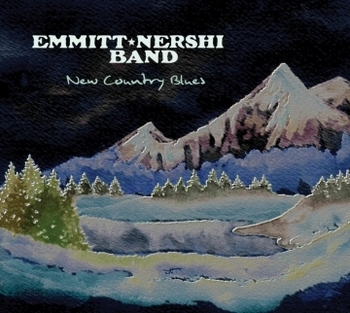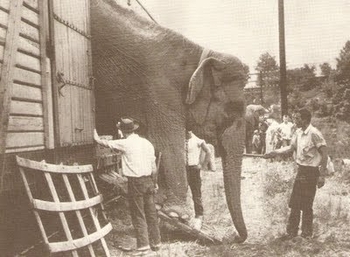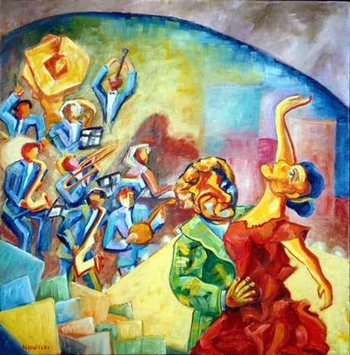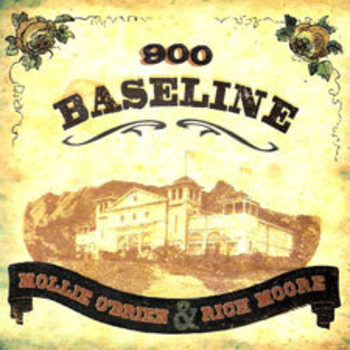
[purchase]
What does jam-band bluegrass sound like? The idea is not at all ridiculous. Bluegrass music offers plenty of room for solos within certain limits. Remove those limits and you have your answer. And New Country Blues, the album, is one answer to what it sounds like.
You see, Drew Emmitt, from Leftover Salmon, and Bill Nershi, from The String Cheese Incident, have wanted to do this for a while. The album sounds like two guys who got some friends together to have fun playing music. Bluegrass music is the foundation for what they do, but some of this music would probably annoy a bluegrass purist. I am not that purist. I can’t provide a technical explanation of what is or is not bluegrass; I can only tell you what I enjoy, and what moves me.
The album opens with a blast of energy that is the title track. This is the most purely bluegrass track on the album. It’s a fast song, with a galloping banjo part propelling it, and with those high tenor harmonies in the vocal. It serves as a proper introduction, in saying “Here is the basis of everything that will come after”.
There are three instrumentals on the album, and they are the other key to where this music is coming from. Back in the 1970s, David Grisman started playing jazzy music on bluegrass instruments with his quintet. There have been many musicians whose work displays Grisman’s influence, most notably Bela Fleck. Emmitt and Nershi’s take on this is subtle when it comes to the jazz elements, but the improvisational freedom is there. And so are some harmonies that are definitely not bluegrass.
But what I find particularly interesting is the way Emmitt and Nershi are able to combine these elements in the same song. Restless Wind opens like one of the instrumentals, with a jazzy feel and genre stretching harmonies; but soon the vocals come in, and there are those wonderful high vocal harmonies straight from the bluegrass world. These two elements are blended seamlessly, and never sound forced. There are instrumental sections that return to that jazzier feel, but the song never loses its way. And that, of course is the joy of jam-band music. There is a musical daredevil act going on, and the listener waits for it all to fall apart. In the hands of Emmitt and Nershi, it never does, and the results are breathtaking. And this is true of the entire album.
Of the eleven tunes on the album, six clock at more than 5:15. That’s a lot of long songs, which can be dull for the listener. But not here. The longer pieces have a dramatic structure to them, with the emotions cresting and ebbing, sometimes more than once in a single song. This can happen in the vocals or the instrumental sections.
I must point some particularly fine instrumental work. Jason Carter from the Del McCoury Band plays fiddle on most tracks; he has a rich creamy tone that you rarely hear outside of classical music, and it is a real treat here. And Andy Thorn plays some banjo lines that sound like a beautiful necklace of glowing pebbles; each note is precious by itself, but the combination is greater still.
The lyrics are the weakest part of a strong effort They are not bad, but they don’t display the imagination of the music supporting them. Restless Wind has a spiritual element that I find interesting, but, too often, the words feel like Emmitt and Nershi’s idea of what bluegrass words should say. Next time, I’d like to hear what Emmitt and Nershi have to say.
Costa Rica ends the album, and it is an exception to most of what I have said. Here, the lead vocal is still appealing, but sung in a lower part of the singer’s range. The bluegrass element is almost entirely gone from the music, replaced by a country/ tropical vibe of the sort that Jimmy Buffet does so well. The lyrics do a wonderful job of evoking the serenity of the scene. And Drew Emmitt delivers a mandolin part that really puts this one over.
So overall, this is an album that is a joy to listen to. The Emmitt Nershi Band is tight and energetic, with enough dynamic and stylistic range to keep the album from having any lulls. I hope they continue this exploration. I would very much like to hear where it takes them next.
Emmitt-Nershi Band: Mango Tango
Emmitt-Nershi Band: Restless Wind














